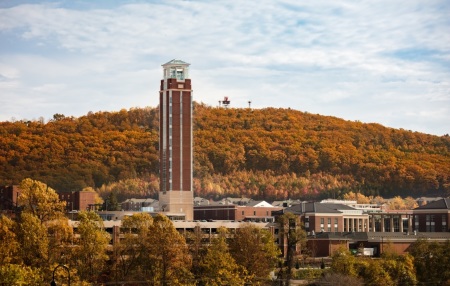Liberty U returns to in-person classes 2 weeks after COVID-19 case surge, offers online option

Liberty University has returned to in-person classes with social distancing encouraged after an outbreak of COVID-19 occurred last month at the Lynchburg, Virginia-based prominent evangelical Christian academic institution.
Last month, the university experienced a sharp increase in COVID-19 cases, prompting school officials to enter a two-week mitigation period in which classes were moved online and large in-person gatherings were prohibited.
In an announcement last Friday, the university explained that the mitigation period had ended and that in-person classes would resume on Monday.
“Liberty is resuming classes and indoor gatherings in a balanced way that both allows members of the campus community to select the university experiences they desire and respects the rights and responsibilities of individuals to make basic health decisions about vaccination and mask usage themselves,” the university stated in an email.
“Students and faculty are strongly encouraged to wear face coverings. The university will continue to offer a digital instruction option for students for a period of time; special permission to attend virtually will not be required during this time.”
Liberty's convocation events will be held outdoors at its football stadium, and indoor activities and events will operate at a 50% reduced capacity.
“The university will still require quarantine for positive COVID-19 cases," continued the statement. "The university will continue to encourage social hygiene practices such as physical distancing and mask-wearing where helpful."
In late August, Liberty announced the suspension of large in-person gatherings and that it would move residential classes online after 124 students and 35 staff tested positive for COVID-19.
In a statement released at the time, the university stated that the mitigation plan was not a campus-wide lockdown but rather a “temporary dial back of some larger indoor activities.”
“Students will NOT be confined to their rooms and are free to use campus facilities and dining venues as usual,” the statement read.
“The quarantine will only occur for those students with new positive cases as well as those who have been determined to have direct exposure to individuals who have tested positive. All others are free to move about and enjoy our beautiful campus as usual.”
In a Sept. 8 update, Liberty disclosed that there were 463 total active cases of COVID-19, with 399 of them being active student cases. About 1,278 on-campus students were reported to be in quarantine, while 402 commuters and 154 employees were instructed to quarantine.
The total number of coronavirus cases represented about 1.6% of the approximately 15,000 students and 5,000 faculty and staff on the campus.
Liberty garnered controversy in March 2020 when it reopened its campus weeks after the COVID-19 pandemic was declared despite concerns that it would lead to a significant outbreak of COVID-19.
Jerry Falwell Jr., who was the university's president at the time, defended the decision, noting that the campus was still going to adhere to certain state emergency orders limiting in-person gatherings.
“We originally believed it was safest to return our students following their spring break instead of having them return following greater exposure opportunities from leaving them in different parts of the country for longer periods,” stated Falwell.
“We want to provide for the continuity of our students’ education while doing what makes sense to help slow the spread of the coronavirus to our university family and local community."





















